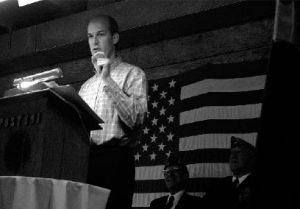The U.S. will remain mired in Iraq come good news or bad, U.S. Rep. Rick Larsen said this week.
Larsen spoke with reporters on a conference call after Gen. David Petraeus, commanding general U.S. forces in Iraq, and Ryan Crocker, ambassador to Iraq, testified Wednesday before the House Armed Services Committee. Larsen,
D-2nd District, is a member of the committee.
Earlier this week, Petraeus suggested a halt in troop withdrawals from Iraq at the end of July, to be followed by a
45-day review period, and then an assessment period of undetermined length before more troops are brought home.
Pres. Bush accepted the general’s recommendation on Thursday, the fifth anniversary of the fall of Baghdad to U.S. forces.
Larsen said the testimony revealed no significant shift in U.S. policy in Iraq.
“It came across as more buying time as opposed to really knowing what we might be getting out of the surge,” Larsen said.
“The open-ended commitment that we heard today from Ambassador Crocker and Gen. Petraeus puts no pressure at all on the Iraqi government to achieve key benchmarks on political reconciliation,” he added.
Larsen also noted the recent comments by CIA Director Michael Hayden, who said al Qaeda has established a safe haven near the border between Afghanistan and Pakistan and now presented a “clear and present danger.”
“The next terrorist attack, should it occur, is likely to originate in the Osama bin Laden safe haven on the Pakistan-Afghan border,” Larsen said. “That’s where we ought to be putting our people, if we have them.”
The U.S. has “under resourced” its forces in Afghanistan because of the Iraq war, the congressman said.
“We have lost sight of where the main terrorist threat is,” Larsen added. “We lack, currently, a readiness of our military to respond to other contingencies.”
Larsen, who voted against the resolution to authorize the use of military force in Iraq in October 2002, has repeatedly called for the U.S. to refocus its military efforts on fighting terrorism across the world rather than becoming further embroiled in Iraq’s ongoing civil war.
Recalling the testimony Wednesday of Vice Chief of Staff Gen. Richard Cody before the House Armed Services Committee, Larsen also noted that continued deployments to Iraq are stretching the military and cannot be sustained.
“He’s saying that the continued deployment rates put our all-volunteer force at risk in this era of persistent conflict,” Larsen said.
Larsen also discounted the talk in some circles that the increase in the U.S. military presence in Iraq is working.
“Based on the professed reasons for the surge — which was to create space in the Iraq government to move forward on political reconciliation — I think the surge has not been a success,” he said.
“I don’t want to discount the obvious improvements in security in the streets of Baghdad. Security has clearly improved over the last 12 months based on the addition of troops and changes we’ve made there,” Larsen said.
But he added that the surge can only be considered a success when the Iraqi government takes the initiative and moves forward on reconciliation. It also must take over the job of security for the country, something that experts say may be a decade away.
The death toll of U.S. troops in Iraq surpassed 4,030 this month.
Larsen last visited Iraq in September. A year ago, he called for a partial recall of American troops. He said this week he could foresee no change in U.S. policy in the months to come.
“Whether security worsens or gets better, we can’t leave. There’s always another reason to stay in Iraq. I believe we need to force the issue, not just for the Iraqis but for ourselves.”
A change in U.S. policy isn’t likely until the next election, Larsen said, noting that Congress has been unable to force changes.
“I doubt very much the votes are there this year. They weren’t there last year, to force major changes in Iraq policy,” he said. “If we don’t have the votes, we don’t have the votes.”
“That debate has shifted elsewhere, which is somewhere in the middle of Pennsylvania,” Larsen added, referring to the upcoming presidential primary.
“Any major change to the conduct of the war is going to have to wait until the next administration…presumably, if it’s a Democratic [administration],” Larsen said.



